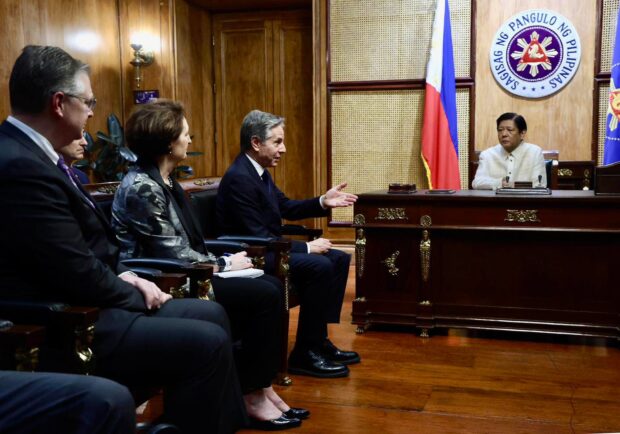Meeting with Blinken ‘absolutely necessary’ for PH-US ties – Marcos

US Secretary of State Antony Blinken meets with President Ferdinand Marcos Jr. at the Malacañan Palace on Tuesday, March 19, 2024. Blinken’s two-day visit is meant to bolster US-Philippine relations through discussions on key issues such as maintaining peace and stability in the disputed West Philippine Sea. (MARIANNE BERMUDEZ / PPA Pool)
MANILA, Philippines — President Ferdinand Marcos Jr. deemed his meeting with US Secretary of State Antony Blinken as “absolutely necessary” in boosting bilateral ties between the Philippines and the US.
Marcos made the pronouncement after meeting with Blinken on Tuesday during the latter’s courtesy call in Malacañang.
According to the Presidential Communications Office in a statement on Wednesday, some of the issues tackled by Marcos and Blinken included efforts to strengthen PH-US alliance, increased cooperation on trade and investment, as well promoting regional peace and security, defense modernization and economic cooperation.

READ: Marcos welcomes Blinken to Malacañang
“We are all familiar with the situations that you are having to deal with the world and it is extremely encouraging for the Philippines that despite all of these extremely important issues that you have to attend to that you consider the Philippines important enough to take time from all global–globally important issues to come with us in the Philippines here today,” Marcos told Blinken and members of his delegation.
“As with many meetings that we have with yourself, of these officials, our meetings always cover a great deal, great regard, wide scope and as again this happened in a quick chat that we just have and this is absolutely necessary. It is important that we continue to do that,” he added.
READ: PH success in asserting rights vs China lauded
Blinken’s visit, which is part of his Asia tour, came amid an increasing tension between the Philippines and China, particularly in its long-running maritime dispute due to the latter’s so-called nine-dash line, a claim that it owns the entirety of the South China Sea, including portions of the West Philippine Sea (WPS).
The Philippines already challenged China’s claim through the International Permanent Court of Arbitration (IPCA) in The Hague in 2013, and won in 2016.
However, China consistently refused to recognize the ruling, ignoring a series of protests and demands made by the Philippine government for Chinese vessels to leave the WPS.
Tensions continued to escalate in the West Philippine Sea after recent incidents of China Coast Guard shadowing and firing water cannons at Philippine vessels.